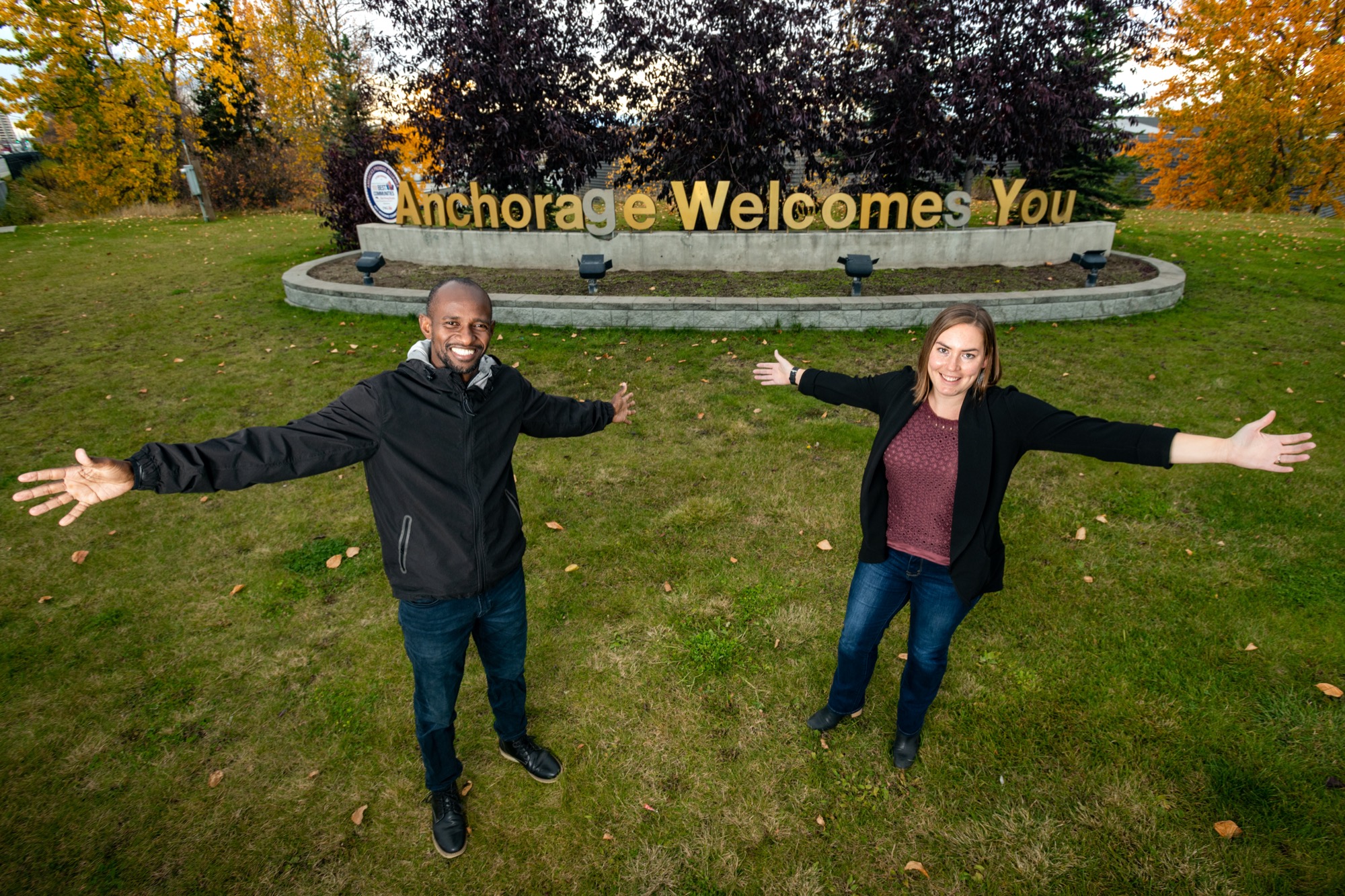Creating a more welcoming city through research
by Catalina Myers |

Since 2014, the Municipality of Anchorage’s (MOA) Welcoming Anchorage project has been building a network between local businesses, organizations and the Anchorage Economic Development Corporation to recognize the contributions immigrants and refugees make to our city through economic, cultural and social impacts. Recently, Welcoming Anchorage collaborated with UAA and brought Amana Mbise, a multicultural postdoctoral fellow in UAA’s School of Social Work, and Sara Buckingham, assistant professor in UAA’s Department of Psychology, to dive deeper into the issue of “untapped talent” within immigrant and refugee communities. The collaboration kicked off last fall where Mbise and Buckingham worked with groups within Welcoming Anchorage to develop a survey that would provide insight into how Anchorage’s immigrant and refugee populations integrate into the city and how that affects their overall ability to access employment.
“We were approached by a group of folks within the MOA and partner organizations to conduct research on what was going well and what can be improved upon,” said Buckingham. One of the main initiatives concerning the group was “brain waste” or “brain drain,” which she describes as immigrants and refugees not being able to use the credentials of their home country, such as a degree or other type of employment qualifier due to barriers like not having access to training opportunities, inability to speak the primary language of a community fluently, as well as discrimination and other factors that may prevent them from securing their desired employment.
The “untapped talent” project within Welcoming Anchorage was the catalyst for Mbise and Buckingham’s research and collaboration where they have focused their research efforts for the last year, developing a survey that would provide the most useful information for the project and overall Welcoming Anchorage initiative. They had a goal of surveying 300 individuals, but as their launch date drew nearer, the global pandemic hit, thwarting their plans.
“It was about January where we started collecting data and we had all these intentions of data collection in-person in collaboration with our community partners and then COVID hit,” said Buckingham. Although they were collecting great data — they’ve had about 180 respondents so far — the pair realized they were likely receiving responses from “tech-savvy” individuals or those who had easier access to technology and those who were likely more integrated into their community. The data did not paint the whole picture, as they were aiming to reach immigrant and refugee populations from all levels of integration within the city, which would take a more “boots on the ground” effort, but was impossible due to following COVID-19 safety protocol.
“That’s been our biggest hurdle, having to adapt to COVID,” said Buckingham. Over the summer and in the fall, the two were able to share their preliminary findings over Zoom and Mbise presented their research to the College of Health at the college’s annual meeting. “We see a lot of trends right now, but we still have a lot of questions.”
Initially, the data points to Anchorage immigrant and refugee populations having a high level of integration in certain domains such as linguistic and social integration, and that the longer they have lived in the city, the more integrated they become. However, a surprising trend shows middle-aged individuals tend to be the most highly integrated into their communities, while those on either side of the bell curve — younger and older populations — tend to be less integrated. The pair said currently what’s missing from their research is the encompassing “why.” Why are middle-aged populations more integrated than younger and older populations?
This brings Mbise and Buckingham to the next stage of their project, which is to hold focus groups with the respondents from the survey. Using their preliminary findings, Mbise and Buckingham have created targeted questions based on what respondents said in their initial survey. Their hope is the focus groups will allow them to drill down deeper and discover what needs to be done to promote more seamless integration across all immigrant and refugee populations in Anchorage.
“At the policy and practice level, Anchorage has really branded itself as a welcoming city — a place where people of all backgrounds are welcome — that’s one aspect of the project, but there is also a workforce development goal,” said Mbise. “Part of our conversations with the municipality has been how can we ensure that these immigrant and refugee populations add to the workforce of the city and the state.”
Mbise said an important part of their ongoing research is to understand the skills and skills gap of immigrant and refugee populations in Anchorage and how to bridge those gaps so individuals feel integrated and like they are contributing to their new communities.
“We know that immigrants come in with various skills — right now it’s just about how do we address that at a policy and state level?” said Mbise. “Of course overall there’s a huge workforce shortage in Alaska and it’s cheaper to train who’s already here in the state than to bring in others from outside.”
According to Mbise, research has shown that immigrant and refugee populations contribute immensely to the economies of the communities and states they settle into and that he and Buckingham’s research goals are two-fold, to not only discover how to create a more integrated approach for these individuals, but how to tap into a valuable resource of talent that will benefit the city and the state for generations to come.
This story originally appeared in the UAA Green and Gold News.
Student Stories
Research
Events and Highlights
Alumni
In the News









